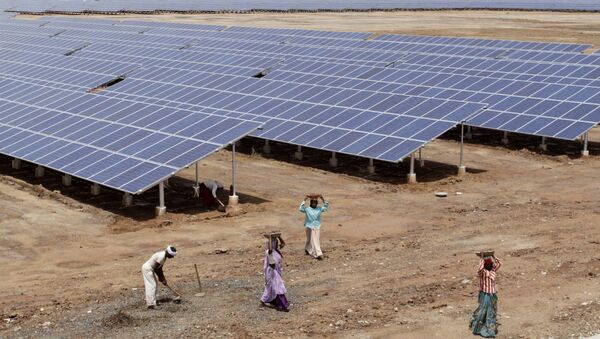Instead, Tuticorin owners implemented a method developed by two Indian chemists that, despite proclaimed goals in green energy, the Indian central government previously refused to consider. The scientists, undaunted, turned to a United Kingdom-based entrepreneur support scheme for seed money.
The technology developed by the Indian scientists uses a form of salt, which, when sprayed as a fine mist, bonds with CO2 in the power plant's chimney. According to statements from the scientists' company, Carbonclean Solutions, the new method is more effective than legacy carbon-cleaning technologies.
While the plant's owner can claim to be ecologically conscious, profit motivated the installation of the filters.
"I am a businessman. I never thought about saving the planet. I needed a reliable stream of CO2, and this was the best way of getting it," owner Ramachadran Gopalan told reporters.
Gopalan is currently considering installing a second boiler at his plant, which would produce additional CO2 from burning coal.
According to reports, Carbonclean Solutions admits that their method of CO2 capture will not stop climate change. They estimate that a realistic impact of their technology, if used on all coal-fired power plants, would be an estimated 7-percent reduction of world CO2 emissions.
The overall ecological impact of the new technology is not known. What is known is that, while eliminating CO2 emissions from the atmosphere, the technology produces alkaline waste. However, the method is less expensive to implement than popular methods of CO2 absorption.
In other attempts to make its energy sector more green, the Indian government has adopted subsidies for a plan to use solar energy to power 60 million homes by 2022.
Adani, the company behind the Kamuthi solar power plant admits that renewables "can't answer India's vast appetite for power to lift people out of poverty." Therefore, the company is looking to create Australia's biggest coal mine, to provide power to 100 million people in India.
It is unclear whether India will stick with Modi's earlier green-energy goals now that US President-elect Donald Trump has announced his intention to ditch US renewable and sustainable energy regulation brought about by outgoing President Barack Obama.
During UN climate talks in Morocco, India notably made no pledge to push green energy policy, despite changes in energy priorities in the US.





